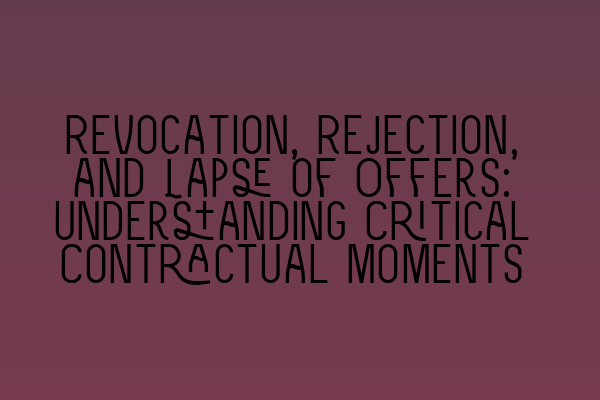Revocation, Rejection, and Lapse of Offers: Understanding Critical Contractual Moments
Introduction
In contract law, certain moments play a pivotal role in determining the validity and enforceability of an offer. These critical moments include revocation, rejection, and lapse of offers. Understanding the implications of these events is vital for both solicitors and clients to navigate the intricate landscape of contract law successfully.
In this blog post, we will delve deeper into revocation, rejection, and lapse of offers, highlighting their significance and exploring how they impact contractual agreements. So, let’s get started!
1. Revocation of Offers
Revocation refers to the act of withdrawing an offer before it is accepted by the other party. It is crucial to note that an offeror has the right to revoke their offer at any time before it is accepted, unless certain circumstances or conditions exist that prevent revocation.
Revocation must be communicated effectively to the offeree. It may be done explicitly, through direct communication, or implicitly, through conduct inconsistent with the continuation of the offer. Once an offer has been properly revoked, it can no longer form the basis of a binding contractual agreement.
To learn more about the revocation of offers, click here: SQE 1 Practice Exam Questions.
2. Rejection of Offers
Rejection occurs when the offeree explicitly declines the offer made by the offeror. Like revocation, rejection terminates the offer and prevents the formation of a contract between the parties. It is crucial for both solicitors and clients to understand that a counteroffer by the offeree also constitutes a rejection of the original offer.
To effectively reject an offer, the offeree must communicate their refusal to accept the terms of the offer to the offeror. The rejection should be clear and unambiguous to avoid any potential misunderstandings.
For further insights into the rejection of offers, visit: SQE 1 Practice Mocks FLK1 FLK2.
3. Lapse of Offers
Offers may also lapse if certain conditions or time limits specified in the offer are not met. Once an offer lapses, it can no longer be accepted by the offeree, and the parties cannot enter into a binding contractual agreement based on that offer.
Various factors can contribute to the lapse of an offer, such as the expiration of a time limit specified by the offeror, the occurrence of a condition precedent, or the death or incapacity of either party. It is crucial for solicitors to advise their clients on the importance of timely acceptance to avoid the risk of offers lapsing.
To enhance your understanding of how offers can lapse, explore: SQE 2 Preparation Courses.
Conclusion
Revocation, rejection, and lapse of offers represent critical moments in contract law that can significantly impact the validity and enforceability of contractual agreements. Solicitors and clients must be well-versed in these concepts to ensure they make informed decisions and protect their rights and interests.
By understanding the implications of revocation, rejection, and lapse of offers, solicitors can guide their clients through the intricacies of contract law, helping them navigate the negotiation and formation of contracts effectively.
To further your knowledge on other important aspects of contract law, visit: SQE 1 Preparation Courses.
Stay updated with the latest news and exam dates in contract law and the SQE: SRA SQE Exam Dates.
Remember, mastering the nuances of revocation, rejection, and lapse of offers is crucial for success in contract law. So, keep exploring, learning, and honing your skills to excel in this field!
Disclaimer: The information provided in this article is for educational and informational purposes only and should not be construed as legal advice. Please consult a qualified solicitor for legal advice tailored to your specific situation.
